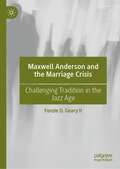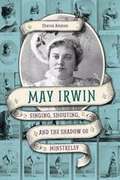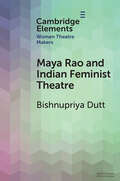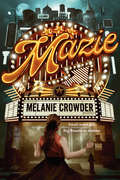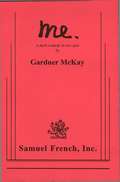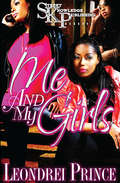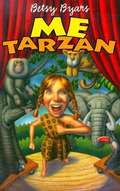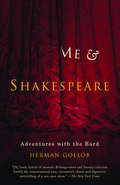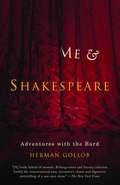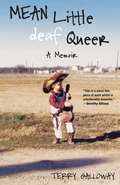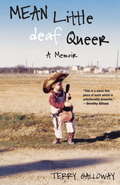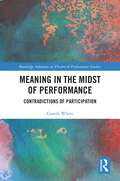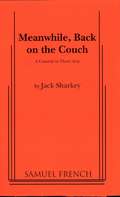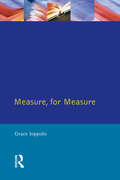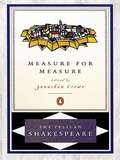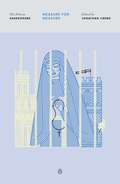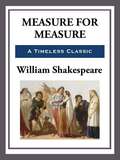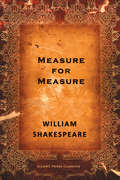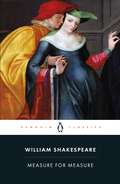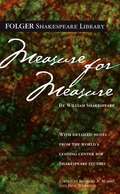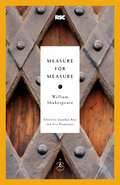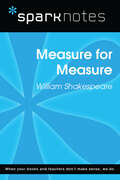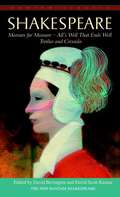- Table View
- List View
Maxwell Anderson and the Marriage Crisis: Challenging Tradition in the Jazz Age
by Fonzie D. Geary IIThis book focuses on the re-evaluation of four Maxwell Anderson plays within the context of the emergence of the New Woman and the perception of a marriage crisis in the United States during the 1920s. The four plays under consideration are White Desert (1923), Sea-Wife (1924), Saturday’s Children (1927), and Gypsy (1929). These plays are largely forgotten and, even when the titles appear in Anderson scholarship, coverage has tended to be cursory and dismissive. This work represents a fresh approach and re-assessment of an American playwright who bore a significant impact on the drama of his time, serving not only to place Anderson’s work more effectively within the context of American theatre during the 1920s, but also to bridge the gap between his work and the marriage-related plays of the late twentieth and early twenty-first centuries.
May Irwin: Singing, Shouting, and the Shadow of Minstrelsy
by Sharon AmmenMay Irwin reigned as America's queen of comedy and song from the 1880s through the 1920s. A genuine pop culture phenomenon, Irwin conquered the legitimate stage, composed song lyrics, and parlayed her celebrity into success as a cookbook author, suffragette, and real estate mogul. Sharon Ammen's in-depth study traces Irwin's hurly-burly life. Irwin gained fame when, layering aspects of minstrelsy over ragtime, she popularized a racist "Negro song" genre. Ammen examines this forgotten music, the society it both reflected and entertained, and the ways white and black audiences received Irwin's performances. She also delves into Irwin's hands-on management of her image and career, revealing how Irwin carefully built a public persona as a nurturing housewife whose maternal skills and performing acumen reinforced one another. Irwin's act, soaked in racist song and humor, built a fortune she never relinquished. Yet her career's legacy led to a posthumous obscurity as the nation that once adored her evolved and changed.
Maya Rao and Indian Feminist Theatre (Elements in Women Theatre Makers)
by Bishnupriya DuttMaya Rao, performer, performance maker and feminist, has not only contributed to Indian feminist theatre, but is a trailblazer, who set new standards in solo performances, mapped an alternate career trajectory for women in theatre and, in the face of right-wing state repression in India, has engaged significantly in performance activism. This Element looks back at her early career in the 1980s when she was creating agit prop theatre for the feminist movement and forward to her performance activism in the twenty-first century, with detailed attention to Rao's acclaimed protest Walk, and her participation in the protests against the Citizenship Amendment Act. The study also encompasses her parallel work in the theatre, from early collaborations with feminist directors to her solo projects. The author traces her creative-political journey towards an egalitarian feminist future.
Mazie
by Melanie Crowder*"Deserves a standing ovation." --Kirkus Reviews (starred review) *"The peppy first-person narrative keeps the story zipping along, and adroitly placed period details make the setting come alive in this bighearted, exuberant novel." --Publishers Weekly (starred review) An eighteen-year-old aspiring actress trades in starry Nebraska skies for the bright lights of 1950s Broadway in this show-stopping novel from award-winning author Melanie Crowder. Mazie has always longed to be on Broadway. But growing up in her small Nebraska town, that always seemed like an impossible dream. So when an opportunity presents itself to spend six weeks auditioning, Mazie jumps at the chance, leaving behind everything--and everyone--she's ever known.New York City is a shock to the senses: thrilling, but lonely. Auditions are brutal. Mazie's homesick and she misses the boyfriend whose heart she broke when she left. Nothing is as she expected.With money running out, and faced with too many rejections to count, Mazie is more determined than ever to land a role. But when she discovers that booking a job might mean losing sight of herself, everything Mazie always thought she wanted is called into question. Mazie is the story of a girl caught between two lives--and two loves--as she navigates who she is, what matters most, and the cost of following her dream. Praise for Mazie: "Entertaining and heartfelt."-- Booklist "Mazie&’s authenticity makes this novel stand out. Recommended for all collections, especially where theater is popular."– School Library Journal
McDougal Littell Literature (Indiana Grade 8 Edition)
by Mcdougal LittellMcDougal Littell Literature invites students to explore the world of art, literature, and life's big questions. Students analyze fiction, nonfiction, poetry, drama, and media across clusters of standards. Special features support visual and media literacy, along with research strategies.
Mcdougal Littell Literature and Language: Ninth-Grade, Orange Level
by Jane N. BeattyAn anthology of fiction, non-fiction, poetry, drama, etc. The selections in this book represent some of the finest examples of unadapted traditional and contemporary literature. There are classics that have been read and enjoyed again and again, as well as exciting pieces that have never before appeared in a literature textbook. What you read will challenge your ways of thinking, illustrate the cultural and ethnic variety of your world, and relate to experiences in your own life.
Me
by Gardner MckayTragi comedy / 4m, 3f or 5m, 2f / Interior / Winner of a NEA grant when presented at Actors Studio and produced on PBS Television Theatre with Richard Dreyfuss and Geraldine Fitzgerald, this is an unusual family story. For six years Tomby has pretended to be retarded while his twin brother has tried to kill him, his sister is in love with him and her finance wants him dead. Father is brain damaged from a Navy wound and it is up to hard working Mom to hold the family together. She knows everyone's secrets but keeps them to herself so the family boat won't rock. The play opens on the eve of the twins' birthday.
Me & My Girls
by Leondrei PrinceTish, Rayon and Tasheena are about to show the world what friendship really means. Each living their own separate lives, they stumbled upon obstacles that would define who they are later in life... Tish- A high school mother learned early about responsibility by having a child by a small time drug dealer who later became a "King Pin" and victim of a quarrel... Rayon- One of Tish's best friend from the suburbs is more of a follower than anything else. She got caught up in a pregnancy and found comfort in her two best friends Tish and Tasheena who were from the projects... Tasheena- Is the direct opposite of the both of them... She was a woman scorned early by the love of her life who abandoned her for a heroin addiction. Unable to deal with the loneliness that overcame her, she sought out comfort from any and every man she could, only digging herself into a deeper depression. Until she discovered Allah (God).
Me Tarzan
by Betsy ByarsNobody knew Dorothy could do such a tremendous Tarzan yell. Not Dwayne, Dorothy's enemy, who wants the part of Tarzan in the class play more than she does. Not Mr. Mooney, their teacher, who has no choice but to give Dorothy the part. Not Dorothy's parents, who are as uneasy as Mr. Mooney about it. Not even Dorothy! But when the uncontrollable urge comes over her--the smell of the jungle, the sense of raw, primitive emotions, the wildness--Dorothy lets out a Tarzan yell so loud, so effective, they all feel its incredible power. And so do the neighborhood animals. More and more animals gather whenever Dorothy practices. Then the circus comes to town, and a puma escapes to Dorothy's yard after one of her yells. What will happen on the night of the play--which also happens to be the opening night of the circus-when Dorothy is determined to give the yell of her life? Betsy Byars's lighthearted story is as exuberant and surprising as Dorothy's Tarzan yell.
Me and Shakespeare
by Herman GollobOn the eve of retiring from a successful publishing career, Herman Gollob attends a wonderful Broadway production of Hamlet starring Ralph Fiennes. Galvanized by the splendor of the language, the drama and the acting, he discovers an insatiable passion for all things Shakespeare. He reads broadly and deeply about the plays, discusses them with some of the great actors, directors, and teachers of our time, and soon finds himself teaching a popular Shakespeare class at a small New Jersey college. Gollob's quest leads him to Shakespeare's birthplace in Stratford-on-Avon; to the Folger Shakespeare Library in Washington, D.C.; to a summer course on Shakespeare at Oxford; and to London's recently rebuilt Globe Theatre. As he pursues his glorious new obsession, Gollob reflects on his family's bittersweet history, his encounters with writers, and the emergence of a Jewish identity that inspires some original ideas about Shakespeare's plays. Me and Shakespeare is a joyful memoir that attests to the power of literature to re-invigorate our lives at any age.From the Trade Paperback edition.
Me and Shakespeare: Adventures with the Bard
by Herman GollobIn this unique memoir, a legendary editor tells how, on the verge of retirement, he developed a passion for the works of Shakespeare and gained new perspectives on his own life.
Mean Little Deaf Queer: A Memoir
by Terry GallowayIn 1959, the year Terry Galloway turned nine, the voices of everyone she loved began to disappear. No one yet knew that an experimental antibiotic given to her mother had wreaked havoc on her fetal nervous system, eventually causing her to go deaf. As a self-proclaimed "child freak," she acted out her fury with her boxy hearing aids and Coke-bottle glasses by faking her own drowning at a camp for crippled children. Ever since that first real-life performance, Galloway has used theater, whether onstage or off, to defy and transcend her reality. With disarming candor, she writes about her mental breakdowns, her queer identity, and living in a silent, quirky world populated by unforgettable characters. What could have been a bitter litany of complaint is instead an unexpectedly hilarious and affecting take on life.
Mean Little deaf Queer: A Memoir
by Terry GallowayIn 1959, the year Terry Galloway turned nine, the voices of everyone she loved began to disappear. No one yet knew that an experimental antibiotic given to her mother had wreaked havoc on her fetal nervous system, eventually causing her to go deaf. As a self-proclaimed "child freak," she acted out her fury with her boxy hearing aids and Coke-bottle glasses by faking her own drowning at a camp for crippled children. Ever since that first real-life performance, Galloway has used theater, whether onstage or off, to defy and transcend her reality. With disarming candor, she writes about her mental breakdowns, her queer identity, and living in a silent, quirky world populated by unforgettable characters. What could have been a bitter litany of complaint is instead an unexpectedly hilarious and affecting take on life.
Meaning in the Midst of Performance: Contradictions of Participation (Routledge Advances in Theatre & Performance Studies)
by Gareth WhiteBeing an audience participant can be a confusing and contradictory experience. When a performance requires us to do things, we are put in the situation of being both actor and spectator, of being part of the work of art while also being the audience who receives it, and of being both perceiving subject and aesthetic object. This book examines these contradictions – and many others – as they appear by accident and by design in increasingly popular forms of interactive, immersive, and participatory performance in theatre and live art. Borrowing concepts from cognitive philosophy and bringing them into a conversation with critical theory, Gareth White sharply examines meaning as a process that happens to us as we are engaged in the problems and negotiations of a participatory performance. This study will be of great interest to scholars and students of theatre and performance, intermedial arts and games studies, and to practising artists.
Meanwhile Back On Couch
by Jack SharkeyComedy / 4m, 4f / Interior / Psychiatrist Victor Karleen is financially pressed between the rental of his posh office apartment and his fiancee's expensive tastes. A colleague has written a best selling case history book and is now rolling in royalties. Good friend Parker Donnelly has rejected Victor's similar work because the public is tired of such things and prefers torrid fiction. Needing cash, Victor reluctantly takes on a new patient who, due to love frustration, is grinding out a rip roaring sex novel. By mistake, his nurse gives the patient's manuscript to Donnelly believing it to be Victor's work. Suddenly Victor has an enormous advance royalty check, a Book of the Month Club selection and a potential Pulitzer prize. When he discovers that it is his patient's inviolate confidences and not his clinical casebook that has saved the day, Victor determines to keep his patient crazy until he dreams up the final chapter. It's fast paced, hilarious and zany.
Measure For Measure: The Folio of 1623
by William Shakespeare Grace IoppoloThe Shakespearean Originals Series takes as its point of departure the question: "What is it that we read Shakespeare?" The answer may seem self-evident: we read the words that Shakespeare wrote. But do we? In the case of all the major editions of Shakespeare available in the market, the fact of the matter is that many of the words that we read in an edition of, say, Hamlet, never appeared in the text as it was printed during or shortly after Shakespeare's own lifetime. They are the interpetations and interpolations of a series of editors who have been systematically changing Shakespeare's text from the eighteenth century onwards. This volume offers the text of Measure for Measure, as printed in the 1623 First Folio.
Measure for Measure
by William Shakespeare Stephen Orgel A. R. Braunmuller"I feel that I have spent half my career with one or another Pelican Shakespeare in my back pocket. Convenience, however, is the least important aspect of the new Pelican Shakespeare series. Here is an elegant and clear text for either the study or the rehearsal room, notes where you need them and the distinguished scholarship of the general editors, Stephen Orgel and A. R. Braunmuller who understand that these are plays for performance as well as great texts for contemplation." (Patrick Stewart) The distinguished Pelican Shakespeare series, which has sold more than four million copies, is now completely revised and repackaged. Each volume features: * Authoritative, reliable texts * High quality introductions and notes * New, more readable trade trim size * An essay on the theatrical world of Shakespeare and essays on Shakespeare's life and the selection of texts
Measure for Measure
by William Shakespeare Stephen Orgel A. R. Braunmuller Jonathan CreweThe acclaimed Pelican Shakespeare series edited by A. R. Braunmuller and Stephen Orgel The legendary Pelican Shakespeare series features authoritative and meticulously researched texts paired with scholarship by renowned Shakespeareans. Each book includes an essay on the theatrical world of Shakespeare’s time, an introduction to the individual play, and a detailed note on the text used. Updated by general editors Stephen Orgel and A. R. Braunmuller, these easy-to-read editions incorporate over thirty years of Shakespeare scholarship undertaken since the original series, edited by Alfred Harbage, appeared between 1956 and 1967. With definitive texts and illuminating essays, the Pelican Shakespeare will remain a valued resource for students, teachers, and theater professionals for many years to come. For more than seventy years, Penguin has been the leading publisher of classic literature in the English-speaking world. With more than 1,700 titles, Penguin Classics represents a global bookshelf of the best works throughout history and across genres and disciplines. Readers trust the series to provide authoritative texts enhanced by introductions and notes by distinguished scholars and contemporary authors, as well as up-to-date translations by award-winning translators.
Measure for Measure
by William ShakespeareOne of the author's "dark" comedies, its compelling characters include a duke masquerading as a monk, a would-be nun ordered to sacrifice her chastity to save her brother's life, and a hypocritical politician. Here is Shakespeare's sensitive, forceful exploration of the basis of good government, public and private morality, and other themes.
Measure for Measure
by William ShakespeareWhen the Duke of Vienna leaves the city under the governance of Angelo, a strict judge, Claudio and Juliet find themselves in violation of Vienna's severe morality laws. With Claudio's life at risk, Isabella, his sister and a novice nun, agrees to plead the case before Angelo. The duke, disguised as a friar, helps Isabella when it becomes apparent Angelo will only help if she compromises herself, and her beliefs. One of Shakespeare's more complex comedies, Measure for Measure examines ethical and moral issues that still resonate today.
Measure for Measure
by William Shakespeare'Language is his power. His characters are precisely the words they speak' A. S. Byatt A young man is condemned to death for breaking a law forbidding sex outside marriage. When his sister pleads with the Lord Angelo to save him, he offers her a bargain - her brother's life in exchange for her virginity. One of Shakespeare's most enigmatic plays, Measure for Measure is a morally complex drama of intricate moves and countermoves that explores falsehood, justice and humanity's best and basest instincts.Used and Recommended by the National TheatreGeneral Editor Stanley WellsEdited by J. M. NosworthyIntroduction by Julia Briggs
Measure for Measure (Folger Shakespeare Library)
by William ShakespeareMeasure for Measure is among the most passionately discussed of Shakespeare’s plays. In it, a duke temporarily removes himself from governing his city-state, deputizing a member of his administration, Angelo, to enforce the laws more rigorously. Angelo chooses as his first victim Claudio, condemning him to death because he impregnated Juliet before their marriage. Claudio’s sister Isabella, who is entering a convent, pleads for her brother’s life. Angelo attempts to extort sex from her, but Isabella preserves her chastity. The duke, in disguise, eavesdrops as she tells her brother about Angelo’s behavior, then offers to ally himself with her against Angelo. Modern responses to the play show how it can be transformed by its reception in present culture to evoke continuing fascination. To some, the duke (the government) seems meddlesome; to others, he is properly imposing moral standards. Angelo and Isabella’s encounter exemplifies sexual harassment. Others see a woman’s right to control her body in Isabella’s choice between her virginity and her brother’s life. The authoritative edition of Measure for Measure from The Folger Shakespeare Library, the trusted and widely used Shakespeare series for students and general readers, includes: -The exact text of the printed book for easy cross-reference -Hundreds of hypertext links for instant navigation -Freshly edited text based on the best early printed version of the play -Full explanatory notes conveniently linked to the text of the play -Scene-by-scene plot summaries -A key to the play’s famous lines and phrases -An introduction to reading Shakespeare’s language -An essay by a leading Shakespeare scholar providing a modern perspective on the play -Fresh images from the Folger Shakespeare Library’s vast holdings of rare books -An annotated guide to further reading Essay by Christy Desmet The Folger Shakespeare Library in Washington, DC, is home to the world’s largest collection of Shakespeare’s printed works, and a magnet for Shakespeare scholars from around the globe. In addition to exhibitions open to the public throughout the year, the Folger offers a full calendar of performances and programs. For more information, visit Folger.edu.
Measure for Measure (Modern Library Classics)
by William ShakespeareWhen a young woman is offered the choice ofsaving a man's life at the price of her own chastity,what should she do? The political and moral corruption of Vienna has driven Duke Vincentio into hiding while his deputy governor, Angelo is left to revive the old discipline of civic authority. Angelos First act is to imprison Claudio, a young nobleman who has gotten his betrothed, Juliet, with child. Under the old laws, this is punishable by death. Angelo next offers Isabella, sister to Claudio and a beautiful young novice about to take her vows, the chance to save her brother's life at the price of her own chastity. Disguised as a friar, the duke returns to manipulate the players and deliver justice in one or Shakespeare's darkest plays concerned with the nature of justice and morality.
Measure for Measure (SparkNotes Literature Guide Series)
by SparkNotesMeasure for Measure (SparkNotes Literature Guide) by William Shakespeare Making the reading experience fun! Created by Harvard students for students everywhere, SparkNotes is a new breed of study guide: smarter, better, faster. Geared to what today's students need to know, SparkNotes provides: *Chapter-by-chapter analysis *Explanations of key themes, motifs, and symbols *A review quiz and essay topicsLively and accessible, these guides are perfect for late-night studying and writing papers
Measure for Measure, Troilus and Cressida, and All's Well That Ends Well
by William Shakespeare David Bevington David Scott Kastan James Hammersmith Robert Kean Turner Joseph PappAn exciting new edition of the complete works of Shakespeare with these features: Illustrated with photographs from New York Shakespeare Festival productions, vivid readable readable introductions for each play by noted scholar David Bevington, a lively personal foreword by Joseph Papp, an insightful essay on the play in performance, modern spelling and pronunciation, up-to-date annotated bibliographies, and convenient listing of key passages.
